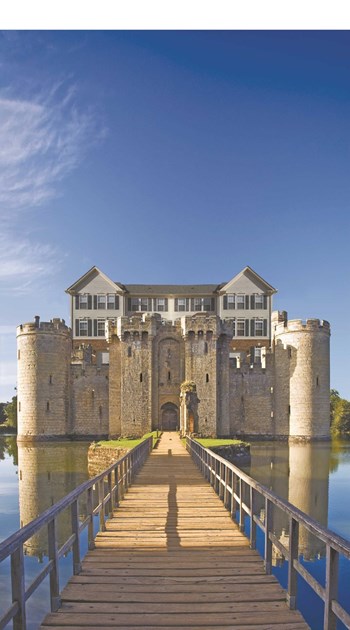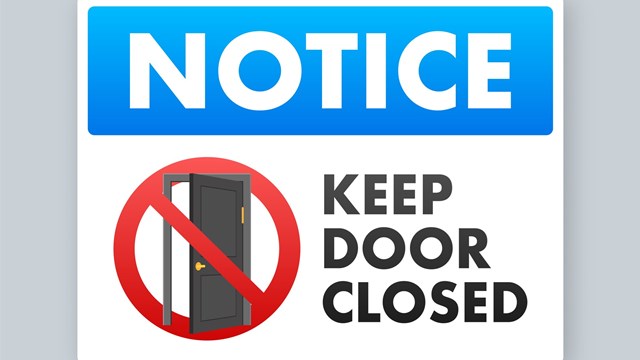
In today’s high-tech world, security can look a lot like a sci-fi movie. Golf clubs' carts can be equipped with laser scanners that can check license plates against an online database of the approved member's vehicles. Elevators will stop on certain floors only if the rider has the correct key card. From a laptop, owners can do everything from allowing a plumber entry into their unit while they are vacationing in the Caribbean to checking out the security feed from cameras in the parking lots.
No Cure for Crime
But security doesn't have to cost a million dollars or involve cutting-edge technology. It can also mean doing something as inexpensive as immediately painting over graffiti and keeping the bushes clear of trash. The appearance of vigilance and a proactive, watchful security policy is every bit as important in keeping an association or building safe as any high-tech gadgetry or expensive monitoring system. “[Attitude and appearance] are very important," says Elliot Boxerbaum, president of Security Risk Management Consultants in Columbus, Ohio. "The more signs of social disorder, the more likely there is to be social disorder.”
No matter how up-to-date or elaborate the technology—or how conscientious the community—what security measures can’t do is eliminate crime completely. The pros agree that the best you can aim for is a program that vehemently encourages criminals to go elsewhere. “I don’t care if you have the FBI, CIA, and 12 police departments, you can’t stop crime. A strong security force may displace it, but it will just go somewhere else,” says Murray Levine, vice president of Florida-headquartered Wackenhut Corporation Security Services.
The steps that go into creating a security program that meets an individual community association’s needs are quite varied and some of the goals don’t even involve security per se, experts say. In addition to protecting owners and their property, security also has an additional function: “It helps protect the image of a community as much as prevent a crime,” says Richard Mullan, vice president of AlliedBarton Security Services, Inc., a national firm with offices in Pleasantville, Voorhees, and West Brunswick.
Many Standards
According to the experts interviewed for this article, there are no rules of thumb in terms of how much a given building or association should budget for security per resident. Nor is there such a thing as a “standard” level of security: For example, a 500-unit suburban development will clearly have different security requirements than that same-sized development in Jersey City or Newark.
In fact, in determining what exactly qualifies a community as "secure," the pros agree that the size of the condominium is actually less a factor than the area’s crime rate and the owners’ expectations. Different municipalities may have different regulations based on size or configuration – requiring high-rises to have secure entrances, for example—but an HOA's needs tend to be more community-specific.
So while there is no formulaic science to determine a development's security plan, what is certain is that boards have a varied degree of responsibility to the residents.
“Condo boards and homeowner associations in New Jersey have a responsibility to exercise reasonable care in making its premises safe," says Jonathan H. Katz, an attorney with the Trenton-based law offices of Sterns & Weinroth. "In addition, a board may have a heightened responsibility to its members if the association’s governing documents require the board to provide a certain level of security, if the board affirmatively takes it upon itself to provide specific security measures for the community or if the board is on notice of a particular safety issue."
One of a condominium board’s more difficult balancing acts is calibrating security needs with what an owner expects in the way of amenities. Those expectations tend to be tied to the affluence of the residents. For example, a 10-unit condominium where each unit cost $5 million is going to demand an extremely high rate of service, explains Levine. “The more expensive the units, the more demanding the residents tend to be,” he says.
While wealthy owners expect—and are able to pay for—24-hour guards and concierge service, a 500-unit development with middle-class owners might be content with a lower-budget electronic access system on the doors. “It’s the level of the amenity—just like service levels at the Ritz Carlton may be different than a Hampton Inn,” says Mullan. Also, he adds, most owners don't want to live in a police state. “If you own a condo, you don't want to feel like you’re going to the courthouse everytime you enter your home.”
Liability Issues
While the experts might agree that each development has unique security needs, there is a baseline when it comes to questions of liability. “The standard has always been based on negligence: Is there a duty? Was there a breach of that duty? Was there damages resulting from that breach?”
"If a board is found to have breached its fiduciary duty to a member or members, any damages that may be recoverable would depend on a number of factors, including whether the action of the third-party causing the damage was foreseeable and whether the association’s actions were negligent and the proximate cause of the member’s injuries or loss," says Katz.
In terms of protecting itself from lawsuits, a condo board might consider bringing in a security consultant firm annually to assess the development’s needs. And a condo board should be OK if they heed a security consultant’s advice. Additionally, their recommendations may be as simple as adding additional lighting or bringing in some additional security guards.
But if you bring in experts, warns Mullan, be careful before disregarding their advice. “That opens up Pandora’s box,” he says. Another strategy, he adds, can be to ask local law enforcement for suggestions.
For developments located in higher-crime areas, strategies should include a “broken windows” approach (named after the famous crime experiment in which broken windows in an urban building were left un-fixed, and the surrounding block quickly deteriorated, with many more broken windows, increased vandalism and loitering, and eventually other criminal activity. Researchers suggested that the perception of neglect and abandonment attracted the criminal element, and perception soon became reality.) Acting quickly to repair acts of vandalism can discourage further acts. “If there are beer bottles, drug paraphernalia, or condoms in the bushes, drug dealers and vagrants know they are safe, because nobody is taking care of the space,” says Boxerbaum. And then there are stronger measures. “If an HOA is located in an area that’s high crime, we strongly recommend that our [guards] be armed,” says Levine.
Instilling a strong sense of community in residents is also a low-cost way to deter crime, whether it’s setting up a community watch or just making sure residents feel empowered to turn on a light or call the police if they hear something suspicious. “I talk to people in gated communities who say, ‘Oh, I don't know my neighbors,’ ” says Boxerbaum. “That’s ripe for crime.” (In fact, statistics suggest that inside gated communities, much of the crime will be committed by the neighbors—or their children.)
Screening security personnel is also extremely important, Levine says. In fact, screening all association personnel is a good idea. “Let’s say you have a high-rise community with 500 rooms, and the plumber has a master key. How are they checking his background? How are they documenting it?” asks Boxerbaum. “A lot of this is stuff [a board] can do for themselves.”
Cutting Costs, Avoiding Liability
In addition to security in common areas, there are also steps that residents can take in their own units. For example, Wackenhut “strongly recommends” that every unit have an alarm system with a panic button terminating in a central station. If the system is implemented throughout the building, residents can save money in two ways: They’ll get a discount on their homeowners’ insurance, and if the HOA qualifies for a bulk discount, residents can greatly reduce the cost of the system and monitoring services.
While security is not typically one of the first things a condo board looks to scrimp on, the recession has caused cuts even there, say some experts—which is unfortunate, they add, since when the economy goes down, crime goes up. For example, in hard-hit real estate areas (including certain parts of New Jersey), “There are so many vacancies right now," says Boxerbaum. "Associations can’t keep up with the maintenance. It’s a downward spiral.”
And neglecting maintenance can become a security issue. “Security cameras are not going to do any good if the lights aren't working or if the bushes are overgrown,” says Boxerbaum, adding that if cameras are there, they need to be working. If they aren’t functional, “you’re giving people a false sense of security. If you just let them fall into disrepair, that certainly could create liability issues."
Mullan knows of gated communities that used to have armed guards at multiple entrances and now have one guard plus an electronic access gate monitored remotely by that guard. Other communities have done away with their roving patrol officers.
Whatever the route your HOA chooses to take, the industry professionals urge that security is not the place to cut corners or bargain-shop. “The difference between a $10,000 nuisance suit and $5 million verdict is the quality of the people protecting the property,” says Levine. He advises that condo boards look into hiring security officers who have a background in either law enforcement or the military, rather than someone who came from Burger King. “But guess what? There’s a price tag difference.”
In the end, HOA boards must balance the needs and expectations of their residents against the financial means and limitations of the association itself. A high-tech security system may give everybody great peace-of-mind, but is it truly warranted? And are residents prepared to foot expensive maintenance and repair costs if the system should go on the fritz? Most security experts agree that the first, perhaps most important step in formulating a workable security plan for any building or association is assessing what exactly "security" means to you.
Yvonne Zipp is a freelance writer and a frequent contributor to New England Condominium magazine, a Yale Robbins’ publication.






Leave a Comment